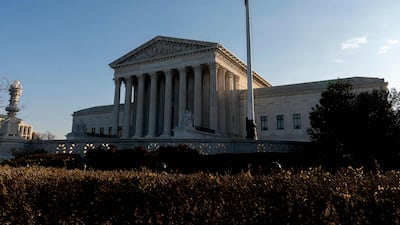The US Supreme Court on Friday ruled in favour of the FBI in a case concerning discrimination claims by three Muslim men from California who accused the agency of conducting illegal surveillance on them after the September 11, 2001, attacks on the US.
The court unanimously overturned a lower court's 2019 ruling that said a federal law regulating government surveillance called the Foreign Intelligence Surveillance Act (Fisa) trumped the state secrets privilege, a legal defence based on national security interests — which the government asserted.
The ruling means the case returns to lower courts for further litigation, with the claims made by the plaintiffs not yet dismissed.
The Supreme Court faulted the San Francisco-based 9th US Circuit Court of Appeals' analysis, with Justice Samuel Alito writing that the Fisa provision in question “does not displace the state secrets privilege".
The lawsuit accused the FBI of infiltrating mainstream mosques in Southern California and focusing on Muslim Americans for surveillance because of their religion.
It also accused the agency of engaging in religious discrimination in breach of the US Constitution's First Amendment as well as the Fourth Amendment prohibition of unreasonable searches and seizures.
The plaintiffs — Yassir Fazaga, imam of the Orange County Islamic Foundation, Ali Uddin Malik and Yasser Abdelrahim — alleged the FBI sent a confidential informant to infiltrate several mosques from 2006-07. They are represented by the American Civil Liberties Union and others.
The lawsuit stated that over a 14-month period, Craigh Monteilh, a local gym trainer with a criminal record, served as an informant for the FBI and was instructed to infiltrate the Islamic Centre of Irvine.
Mr Monteilh adopted a Muslim name and told congregants at the mosque that he wanted to convert to Islam as he collected information on the community, court papers show.
The ACLU alleged that Mr Monteilh recorded prayer groups at the mosque and also recorded videos in mosques, homes and businesses.
Members of the community reported him to the FBI and other authorities after he suggested they carry out a terrorist attack.
“I said we should carry out a terrorist attack in this country,” Mr Monteilh told NPR's This American Life.
“We should bomb something.”
A federal judge in 2012 dismissed the claims against the FBI, determining that they were barred under the state secrets privilege. The judge did permit claims accusing some individual FBI agents of violating the surveillance law.
The 9th Circuit ruled that the religious claims should instead be analysed under a section of the FIisa law that lets judges review the legality of surveillance.
The court also allowed the unlawful search claims, not at issue before the Supreme Court, to move forward.
Reuters contributed to this report

